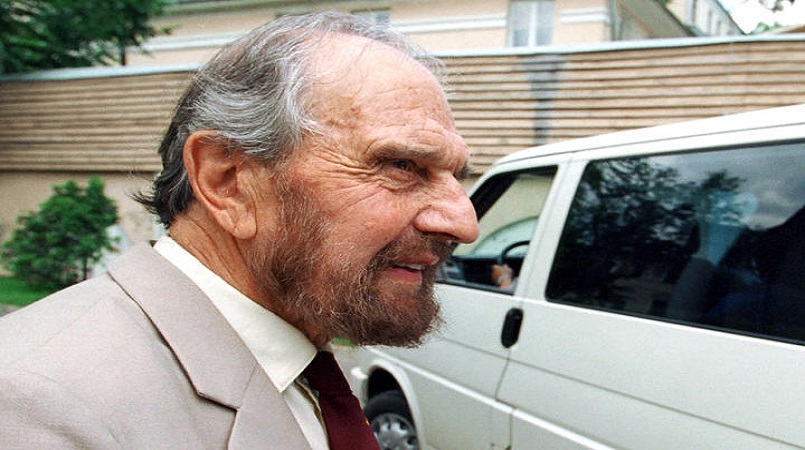
George Blake, the former MI6 officer and one of the Cold War's most infamous double agents, has died aged 98, Russian media has reported.
Over nine years, the Soviet spy handed over information that led to the betrayal of at least 40 MI6 agents in Eastern Europe.
He was jailed in London in 1960, but escaped in 1966 and fled to Russia.
The Russian Foreign Intelligence Service said Blake "had a genuine love for our country".
Prison escape
Blake's escape from Wormwood Scrubs prison in London in 1966 was a major embarrassment to the government of Harold Wilson.
Blake, convicted of betraying British MI6 agents to the Soviet Union, had completed just five years of a 42-year sentence.
His escape was arranged by three former inmates, including two peace campaigners, and financed by the film director Tony Richardson.
With the help of friends he was hidden in safe houses before managing to escape to the Soviet Union, where he spent the rest of his life.
Blake was born George Behar on 11 November 1922 in the Dutch city of Rotterdam.
His father was a Spanish Jew who had fought with the British army during World War I and acquired British citizenship.
At the age of 13 Blake was sent to Cairo where he stayed with his father's sister, who was married to a wealthy banker.
There he became close to one of his cousins, a committed communist who, Blake remembered, had a great influence on him.
He returned to the Netherlands in the summer of 1939 and was staying with his grandmother in Rotterdam when the Germans invaded the following spring.
His mother and sister were evacuated to England but Blake remained, and as a British citizen was temporarily interned by the Germans.
When it became clear the proposed German invasion of England would not take place, Blake managed to get hold of forged papers and joined the Dutch resistance.
"Although I was 18," he later recalled, "I looked much younger and therefore was very suitable to act as a courier."
Fluent
Over the next two years Blake carried messages between Dutch resistance groups but eventually decided to try to reach England and join the armed forces.
He travelled down to neutral Spain where, after being imprisoned for three months, he managed to reach England via Gibraltar.
He joined the Royal Naval Volunteer Reserve where he was asked, because of his background, if he would like to work in intelligence.
He was fluent in Dutch and was deployed to decipher coded messages sent to London by the Dutch resistance.
When the war ended, he was posted to Germany where he spied on the Soviet forces occupying what was then East Germany.
He was so successful it was decided to return him to England where he learned Russian at Cambridge.
Blake later said: "In a way it shaped another stage in my development towards communism, towards my desire to work for the Soviet Union."
Bombing
He was transferred to South Korea just before the outbreak of war between the western-backed South and Soviet-backed North.
His job was to set up a network of agents to spy on the North but poor communications made his task difficult.
When the North captured the city of Seoul, Blake found himself interned along with a number of diplomats and missionaries.
He later denied claims that he had been brainwashed into working for the Soviet Union.
Photo: AFP / Kommersant Caption: George Blake, shown in 2001, had lived in Moscow since the 1960s.
